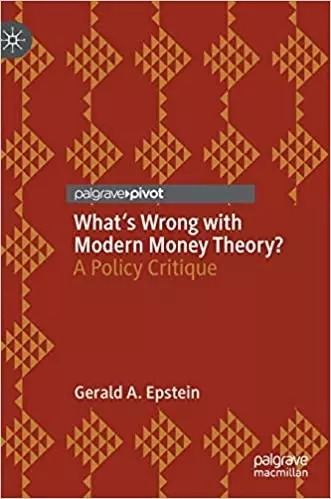What's Wrong with Modern Money Theory?
Gerald A. Epstein
What's Wrong with Modern Money Theory?
Gerald Epstein, a progressive economist, shares many socio-economic objectives with Modern Monetary Theory, but offers a critique. He first claims that MMT doesn’t fit within current financial institutional structure and practice, eg between the US Treasury and Federal Reserve. But surely such structures are not set in stone? Institutions should serve humanity rather than the reverse. The Sabbath was made for man and not man for the Sabbath. He makes the wry point that MMT has been sold to wealthy corporate interests because it excuses them from the need to pay more tax to fund social programs (p80).
Epstein worries that MMT can’t be implemented in developing country economies, and that even the mighty US dollar might not always allow the US to issue overseas debt in its own currency. This is because Epstein has taken a specific version of MMT which insists that sovereign money is still issued as debt. According to this view, debt doesn’t matter because it is balanced out by financial surpluses in the two other sectors of the economy, according to the ‘Godley identity’ which Epstein fleetingly mentions on page 5. Surprisingly, Epstein offers no theoretical critique of this point within MMT, despite it being a flaw in MMT theory, since this post-hoc identity cannot be used as a behavioural equation. A change in one sector will not be matched by equal changes in the other two, but will generate a total recalculation of the economy to end at a new and different value for the identity. This money-as-debt version of MMT generates substantial financing costs.
There are two alternative specifications of sovereign money which Epstein doesn’t cover.
1 Joseph Huber’s proposal in ‘Sovereign Money’ is to monopolise money creation with central banks, and so eliminate commercial bank money creation. This is because Huber blames commercial banks for over-lending to create the 2007 crisis, and because he wants to return seigniorage to the state.
2 My own definition of sovereign money shares the MMT view that a sovereign state can issue money, but differs in defining that money as debt free. This blows away many of Epstein’s objections which are debt based. The conceptual argument is that money is referenced neither by gold reserves, nor by sale of government bonds, but by full potential output GDP. Epstein appears to uphold the category errors of financial orthodoxy, that government budgets must ultimately balance, either in the current period or as debt, and that affordability is determined by government financial balances. The empirical argument is that current debt mountains equal to >100% of GDP will never be repaid, and so are not real debt. But they do demand huge debt servicing costs. Cash is currently issued debt-free, so why not other money? If the national debt will never be repaid, it doesn’t take much imagination to create debt-free money. I don’t follow Joseph Huber in insisting on a state monopoly in money creation, only that the state can create sovereign money.
Finally, Epstein raises the question of how government expenditure will be paid for. Commissioning all proposed MMT schemes of job guarantee, green new deal, Medicare for all, free college education and universal childcare would vastly exceed the output potential of the economy. But the MMT school is right when it insists the answer is ‘real resources’. What pays for our current levels of consumption is the huge productivity of the production economy. Technological automation will increase this affordability, as Epstein puts it ‘spending on investment that creates more capacity’ (p82). As Epstein admits, the MMT school has implemented this affordability methodology with its Keynesian ‘How to pay for the war’ methodology. MMT needs refinement, but does offer some necessary correctives to financial orthodoxy.
The book is available here.
Geoff Crocker
Editor ‘The Case for Universal Basic Income’
www.ubi.org

